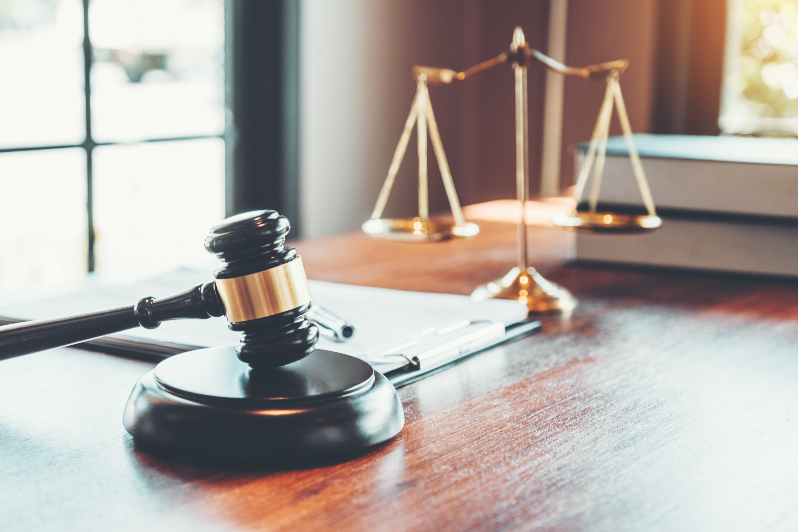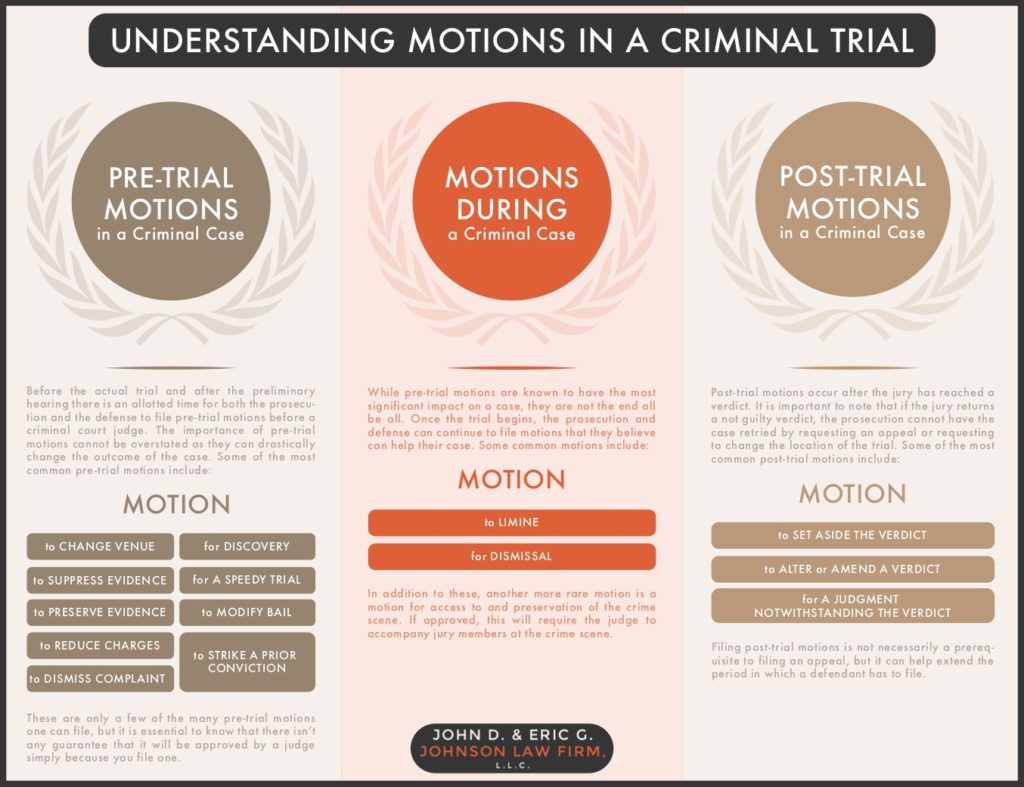

As a defendant in a criminal trial, there’s a host of information to be aware of including proper courtroom decorum, how to dress for court, and how to adequately refute charges. If that weren’t enough, there is also an entire system of “motions” that one may pursue to achieve a desirable result.
A motion, in the most basic sense of the term, is a request of the judge. In response, the judge can either approve or dismiss the motion. As with most aspects of criminal defense, most people are unaware of how, when, or what type of motion to file. While your criminal defense attorney is there to handle these aspects of the litigation process for you, it can be to your benefit to know the possible motions you can file in your case.
Pre-Trial Motions in a Criminal Case
Before the actual trial and after the preliminary hearing, there is an allotted time for both the prosecution and the defense to file pre-trial motions before a criminal court judge. The importance of pre-trial motions cannot be overstated as they can drastically change the outcome of the case. Certain factors like what evidence should be deemed inadmissible, who can and cannot take the witness stand, and what arguments one can and cannot make at trial can all be determined via pre-trial motions.
The opportunity to file a pre-trial motion only comes around once, which is why it is best that you discuss with your attorney which motions, in particular, can be beneficial to your case. Some of the most common pre-trial motions include:
- Motion to Change Venue: a request to change the location of court proceedings to ensure a fair trial
- Motion to Suppress Evidence: a request to have illegally obtained evidence excluded from the trial
- Motion to Preserve Evidence: a request to have evidence preserved until the defense can have an expert or investigator examine it
- Motion to Reduce Charges: a request to have charges lessened to those that more accurately fit the offense
- Motion for Discovery: a request to have the prosecution turn over all evidence against the defendant to the defense
- Motion for a Speedy Trial: a request to expedite the trial process
- Motion to Modify Bail: a request to change the bail placed for the defendant’s release
- Motion to Strike a Prior Conviction: a request to have a defendant’s criminal history stricken from the court record which can result in the court overlooking the defendant’s past crimes and sentencing the individual as a first-time offender
- Motion to Dismiss Complaint: a request to dismiss the case
These are only a few of the many pre-trial motions one can file, but it is essential to know that there isn’t any guarantee that it will be approved by a judge simply because you file one. You’ll need to back your motion with sufficient reasoning as to why the judge should accept your request. If done correctly, filing the proper pre-trial motions can have penalties drastically reduced, or even charges dropped altogether.
Motions During a Criminal Case
While pre-trial motions are known to have the most significant impact on a case, they are not the end all be all. Once the trial begins, the prosecution and defense can continue to file motions that they believe can help their case. Since so many limitations and restrictions have been predetermined, the motions filed during a trial often address the opposition’s inability to meet those agreed upon terms.
For example, if a prosecutor blurts out evidence or mentions a testimony during the trial that was deemed inadmissible as a result of a successful pre-trial motion, the judge will likely issue an order to vacate. This essentially tells the jurors to disregard what was just stated. Some other common motions include:
- Motion to Limine: a request to keep inadmissible evidence from being presented to the jurors before prosecutors introduce it
- Motion for Dismissal: a request made after the prosecution presents evidence to have the case dismissed as the prosecution has failed to give a strong enough case to prove the defendant’s guilt.
In addition to these, another more rare motion is a motion for access to and preservation of the crime scene. If approved, this will require the judge to accompany jury members at the crime scene.
Post-Trial Motions in a Criminal Case
Post-trial motions occur after the jury has reached a verdict. It is important to note that if the jury returns a not guilty verdict, the prosecution cannot have the case retried by requesting an appeal or requesting to change the location of the trial. However, if the jury reaches a guilty verdict, the defense can file a host of post-trial motions. Some of the most common post-trial motions include:
- Motion to Set Aside the Verdict: a request to have the judge overturn the verdict
- Motion to Alter or Amend a Verdict: a request to have the case retried
- Motion for a Judgment Notwithstanding the Verdict: a request to have the judge issue a verdict that is contrary to what the jury rendered.
Defense teams usually file post-trial motions in cases where the jury renders the verdict and not the judge as it’s understood that the judge is highly unlikely to overturn a ruling that he or she issued. If post-trial motions are unsuccessful, the next step would be to appeal the decision. Filing post-trial motions is not necessarily a prerequisite to filing an appeal, but it can help extend the period in which a defendant has to file.
Knowledgeable Criminal Defense Lawyers in Louisiana
Pursuing the most appropriate motions in your criminal case can be the difference between you being returned to your loved ones and being escorted out of the courtroom in handcuffs. With so much at stake, it is crucial that you have an experienced attorney by your side who you believe will do everything in their power to mitigate your legal issues.
Louisiana criminal defense attorney Eric G. Johnson of the Law Offices of John D. & Eric G. Johnson, LLC has experience litigating criminal cases throughout Louisiana and protecting the rights of the accused. Eric has handled a diverse range of cases involving everything from violent offenses to white collar crimes. Bring your case to Eric and let him inform you of the most favorable ensuing actions. Contact us today at 318-377-1555 for a free case evaluation.

